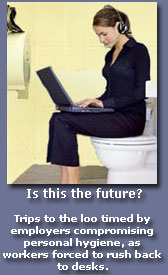 |
|
|
|
Just another outlandish headline used to get an audience - you think? Well, amazingly in 2018, the above scenario is commonplace for building workers, telecom engineers, call centre and warehousing staff, train drivers and of course bus drivers!
Once again, employers ignore the health of their workforce. Restrictions or lack of toilet facilities could worsen the health conditions faced by some workers, and apart from that cause things like cystitis, continance problems, bladder infections and bowel illnesses. Work related stress can also be a subsequent condition as a result of workers not being able to use a toilet when required, not to mention the physical stress on the body as a result of the lack of toilet facilities and the need to 'hold on' for several hours! Denial of the use of toilet facilities is not unusual report many bus drivers, haulage drivers and delivery drivers. The situation is so bad that the British Toilet Association has a Facebook campaigning page, “Truckers’ Toilets UK”, which highlights some of the problems they have faced. But it seems that even the bad publicity for companies does not make them any less culpable of not providing what is a basic human right. Last year, Fife Council received numerous complaints from residents about HGV drivers parking on residential roads and urinating in public, which also resulted in local newspaper coverage. As a result Amazon were forced to acquire additional land at its Dunfermline distribution centre to provide safe and secure parking, complete with toilet facilities for delivery lorries. On Merseyside there were demonstrations at Liverpool docks, where Peel Ports’ new facility had inadequate parking and toilets for the constant stream of drivers visiting it. The nearest toilets with lorry parking that the drivers queuing for the terminal could use were 20 miles away. This demonstration, organised by Unite the union, was covered by the BBC news. Last November the HSE updated their 'guidance to employers' following a long campaign by the Trade Union, Unite; to force changes in the law ensuring the responsibility of employers is to provide ALL their employers access to toilet facilities. More recently, Unite has done a survey of its members and what it found with regards to sanitary facilities was that many workers in the UK are not given the human dignity of having access to toilet facilities during their working hours!
“We were surprised by how much of an issue it was with our members,” Unite communications officer Barckley Sumner told the i Newspaperi. “We’re talking construction, banking, lorry driving, bus drivers are saying they’re not allowed to have a break for five hours. It’s totally impossible,” he said. Some workers have been told going to toilet on any other time than their break is unacceptable. Anecdotal stories of the lack of toilet facilities include: One bank worker with serious health issues was told that their nearest toilet was in a nearby shop, and ended up wetting themselves because they didn't make it in time.
“It is simply disgraceful that in 2018, tens of thousands of UK workers are denied toilet dignity at work. The examples that Unite has revealed are simply staggering and it is clearly deeply humiliating for the workers who are being denied toilet dignity. Employers have got absolutely no excuse for ensuring toilet dignity and if they fail to do so they should be prosecuted by the HSE." Concluding he told iNews: “Unite will not be passive on this issue, if workers are denied toilet dignity we will name and shame the guilty parties.” The HSE announced last November, their plans to change the guidance supporting the Workplace (Health, Safety and Welfare) Regulations, making it clearer that delivery drivers have the right to use an employers’ toilets while conducting deliveries. A HSE spokesperson said at the time: “The HSE has been aware for some time of concerns around access to welfare facilities for visiting delivery drivers. We have reviewed our approach including guidance to dutyholders and re-examined the Workplace (Health, Safety and Welfare) Regulations 1992, in particular Regulations 20 and 21." "The requirement to give access to toilets and washing facilities also means that drivers can ensure that their hands are clean and hygienic. This is particularly important if drivers are making food deliveries." "We will begin to update our guidance to say that drivers must have access to welfare facilities in the premises they visit as part of their work. As this is likely to take some time, key stakeholders are being informed now. “The welfare of all workers is a priority and we have consistently said that drivers should have this sort of access. We also recognise that the majority of dutyholders do already provide reasonable access to toilets.”
Regulation 20 is on sanitary conveniences, and Regulation 21 is on washing facilities. Both say that “suitable and sufficient” facilities should be provided at all workplaces. The HSE publication L24 Workplace health, safety and welfare incorporates an Approved Code of Practice (ACoP) and additional guidance alongside the text of the regulations themselves. The regulator is now planning to change the text of the ACoP and guidance to clarify that facilities must be made available to delivery drivers or workers. However, this must be seen with the backdrop of the HSE currently changing ACoPs into mere guidance rather than as they are now, pseudo mandatory, with adherence to them being evidence often successfully used as defence in cases of prosecution. Another HSE publication, HSG 136, A guide to workplace transport safety, was amended in 2014 to make it clear that delivery drivers should be considered “workers” rather than “visitors”, and therefore be included under the Workplace (Health, Safety and Welfare) Regulations. Source: i News / H&S at Work / HSE
|

 In the case of BT, call centre staff have had to 'log off' with a code whenever they need to go to the loo, and have even faced disciplinary action over the time they take whilst there! More and more employers are using technology to record how often and for how long, their employees use the toilets!
In the case of BT, call centre staff have had to 'log off' with a code whenever they need to go to the loo, and have even faced disciplinary action over the time they take whilst there! More and more employers are using technology to record how often and for how long, their employees use the toilets!  They discovered that bankers, bus drivers, construction workers, financiers, lorry drivers, warehouse workers and agricultural workers are the most commonly affected, with some drivers saying that they are only allowed to have a toilet break every five hours.
They discovered that bankers, bus drivers, construction workers, financiers, lorry drivers, warehouse workers and agricultural workers are the most commonly affected, with some drivers saying that they are only allowed to have a toilet break every five hours.  Commenting on the situation in the UK, Unite assistant general secretary Gail Cartmail said:
Commenting on the situation in the UK, Unite assistant general secretary Gail Cartmail said:  The
The